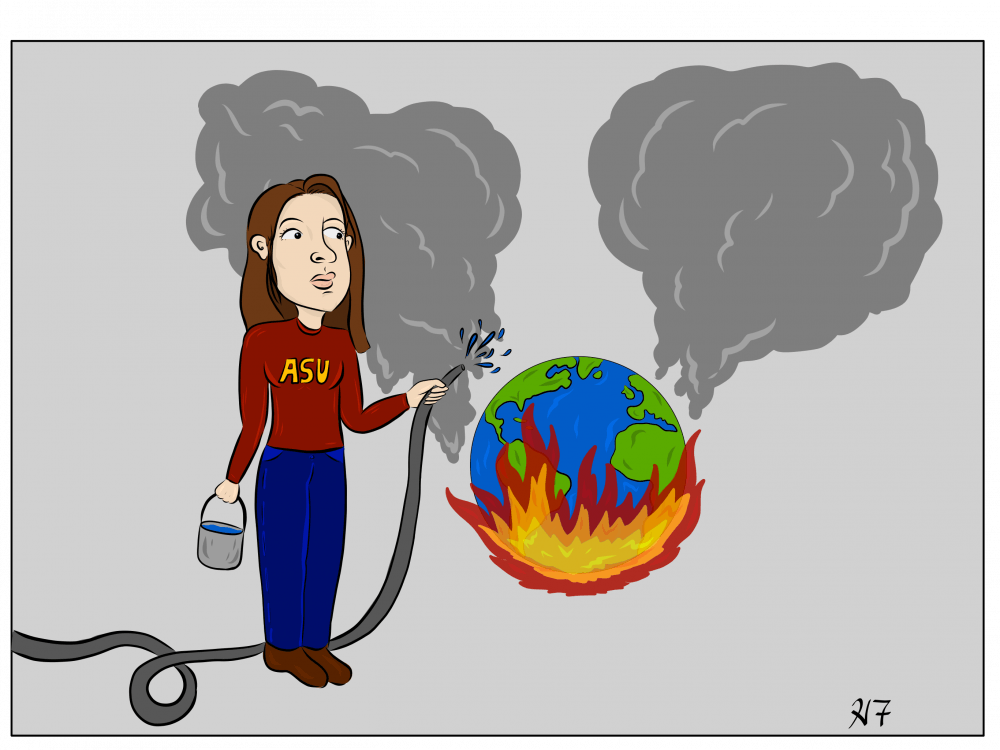Global climate change is an issue we simply can’t afford to ignore. The effects of climate change – spanning health, agriculture, water, weather, air and virtually all other aspects of human life – are already far-reaching, and they only threaten to get worse.
A reported 64 percent of Americans are worried about global warming. However, this worry easily transforms into a feeling of helplessness, a feeling that many of us are familiar with. Despite great concern over climate change, it’s easy to feel as though there’s nothing to be done. Concern has a tendency to fade into weary and sad resignation.
As college students, we don’t have to feel helpless in the face of global climate change. In fact, our Earth’s future depends on a widespread commitment to climate action, inspired by hope (and perhaps, also driven by fear).
While the task before us is immense, there is reason to be hopeful.
Recently, at climate talks in Kigali, Rwanda, the U.S. and almost 200 other nations agreed to phase out the use of hydrofluorocarbons (HFCs), a very strong greenhouse gas found in things like air conditioners and refrigerators. Increasing HFC emissions contribute significantly to global warming; their reduction, if fulfilled successfully, will have an enormous impact.
It is currently unclear whether the Kigali agreement will require approval from the U.S. Senate. However, if the agreement does require ratification, it could face serious Senate opposition. In the event of a debate in the Senate over ratification, pressure from college students could play a significant role.
Beyond the Kigali agreement, college students should demand that all of our elected representatives are committed to implementing effective environmental policies. In the fight against global climate change, all levels of government matter: from student government officials who can implement sustainable campus policies, to state legislators who can prioritize environmentally-conscious regulations, to a president who can promote international collaboration on climate issues.
Even beyond government action, individual choices can make a difference in the fight against climate change.
In response to global climate change, “The number one thing that students can do is look inwardly at their personal choices, and probably the one that is going to have the greatest impact is their choice of diet,” said Nicole Darnall, an ASU professor of management and public policy at the School of Public Affairs and the School of Sustainability.
According to Darnall, the climate effects of animal husbandry are greater than those of, for example, transportation or petroleum, and so eliminating meat from one’s diet has a large positive impact. Studies estimate that 18 to 51 percent of greenhouse gas emissions are attributable to animal husbandry.
“The food that we source and how it’s sourced has massive implications,” Darnall said.
Besides diet, there are numerous other choices students can make to reduce their environmental impact. As students, we can opt to use public transportation or to bike or walk, and in doing so we can encourage public officials to improve public transportation and vehicle alternatives. We can be conscious about our water and electricity use – maybe your apartment doesn’t need to stay at 70 degrees at all times, 75 degrees really isn’t that bad.
Being informed about environmental issues and using this knowledge to educate others and demand change is critical. It’s also important to be aware of our own individual environmental impacts, something which can be calculated using the Environmental Protection Agency’s Household Carbon Footprint Calculator.
While climate change is likely the greatest challenge our generation will face, it is not un-faceable. Rather than feeling helpless, each of us needs to make concrete commitments to action on climate change. We can only afford to move forward.
Reach the columnist at maarmst7@asu.edu or follow @MiaAArmstrong on Twitter.
Editor’s note: The opinions presented in this column are the author’s and do not imply any endorsement from The State Press or its editors.
Want to join the conversation? Send an email to opiniondesk.statepress@gmail.com. Keep letters under 300 words and be sure to include your university affiliation. Anonymity will not be granted.
Like The State Press on Facebook and follow @statepress on Twitter.




